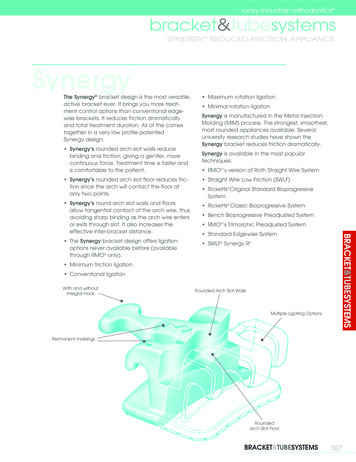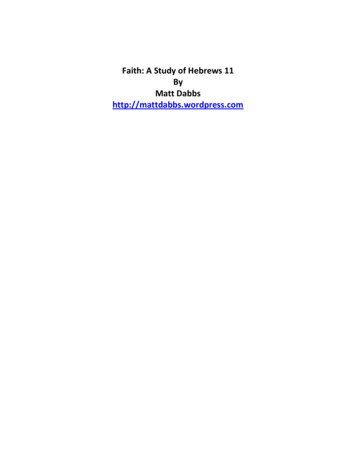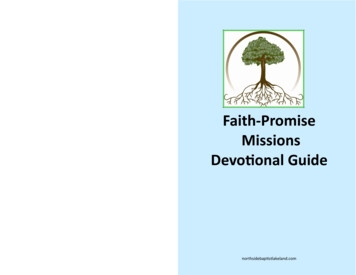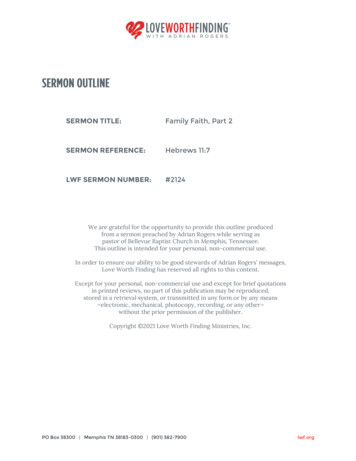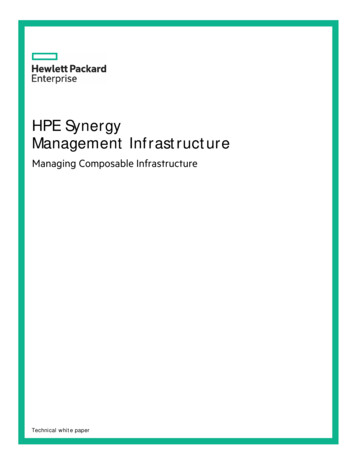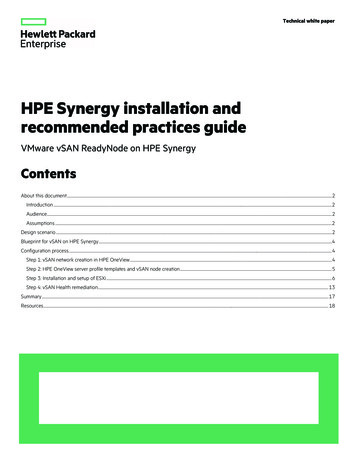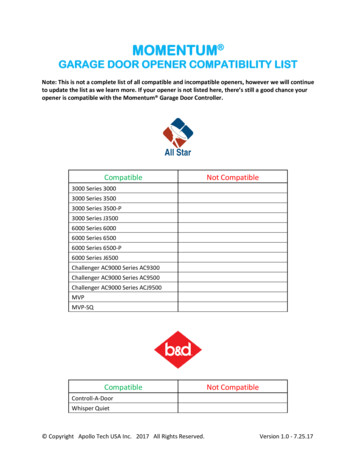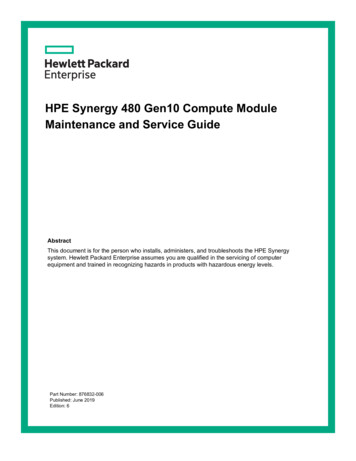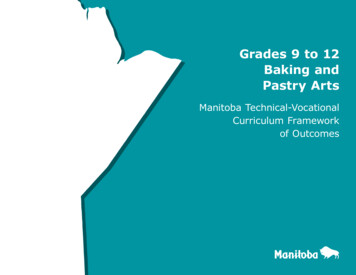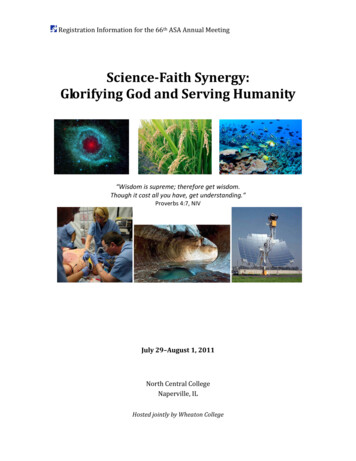
Transcription
Registration Information for the 66th ASA Annual MeetingScience-Faith Synergy:Glorifying God and Serving Humanity“Wisdom is supreme; therefore get wisdom.Though it cost all you have, get understanding.”Proverbs 4:7, NIVJuly 29–August 1, 2011North Central CollegeNaperville, ILHosted jointly by Wheaton College
Plenary SpeakersSteven Bouma-Prediger is Professor of Religion and Chair of the Religion Department atHope College, Holland, MI, and he also directs and teaches in the Environmental StudiesProgram. His book For the Beauty of the Earth (Baker Academic, 2001) won an “Award ofMerit” from Christianity Today in the magazine’s “2002 Book Awards” program. The secondedition was released in April 2010. Steven will be speaking on “One Example of Science-FaithSynergy: How We Can Glorify God and Serve Humanity by Caring for the Earth”Dorothy Chappell is Dean of Natural and Social Sciences at Wheaton College, IL. At Wheatonsince 1977 in various roles, she spearheaded the building of the 62 million science centerthat was awarded the Leed Gold Certification on Oct. 6, 2010. Dorothy co-edited with E. DavidCook, Not Just Science: Questions Where Christian Faith and Natural Science Intersect(Zondervan, 2005). Her talk is titled, “Challenges, Changes and Chalices in the NaturalSciences.”Katharine Hayhoe is a climate scientist and professor of Geosciences at Texas TechUniversity. As an expert reviewer for the Nobel Peace Prize-winning IPCC and author ofA Climate for Change: Global Warming Facts for Faith-Based Decisions (with Andrew Farley,Hachette/FaithWords, 2009), she is dedicated to communicating the realities of a changingclimate to those who will be affected most by it. Katharine will address “Climate Change:Why Are Science and Faith in Conflict?”William Hurlbut is a consulting professor in the Department of Neurology and NeurologicalSciences, Stanford University Medical Center, CA. He served eight years on the President’sCouncil on Bioethics. He came to national prominence for his advocacy of Altered NuclearTransfer (ANT), a scientific method of obtaining pluripotent stem cells without the creationand destruction of human embryos. William will speak on “Stem Cells, Embryos and Ethics:A Continuing Controversy.”Gareth Jones is Professor of Anatomy & Structural Biology and Director of the BioethicsCentre at the University of Otago, in Dunedin, New Zealand. Recent books include A TangledWeb: Medicine and Theology in Dialogue (co-edited with John Elford; Peter Lang, 2009); andA Glass Darkly: Medicine and Theology in Further Dialogue (co-edited with John Elford; PeterLang, 2010). Gareth will address “Glorifying God in a Scientific Milieu: The ContrastingDomains of Neuroscience and Reproduction.”Mary Schweitzer is Professor of Marine, Earth, and Atmospheric Sciences at North CarolinaState University and Curator of Vertebrate Paleontology at the NC Museum of NaturalSciences in Raleigh, NC. She was the first researcher to identify and isolate soft tissues froma 68 million-year-old fossil bone. Her presentation is titled “Dinosaurs under the Microscope:A New Look at Old Dinosaurs.”
Workshop DescriptionsFRIDAY, July 29, 2011, 9:00 AM–4:00 PMWORKSHOP 1: Science and Scripture: Interpreting the InformationTerry Morrison, LeaderScientists, as well as scholars studying Scripture, Church History, etc., have a common task: dealing with“information,” that is, the experimental data and the interpretations of the scientists and the biblical dataand interpretations of the theologians. This also involves questions of critiquing the sources of the data, etc.And of course, there is the question of “The Question,” i.e., what is it you want to know/understand?For the Christian in science, e.g., ASA members, these constitute an overlap of the foci of our lives. Can welearn from appropriate approaches in either Scripture/theology studies or philosophy of science and fromtheologians and science practitioners, things that will advance our work, our understanding, and our livingas effective Christians?Four scholars will address these issues. They are John Walton, www.wheaton.edu/Theology/faculty/walton;Kevin Vanhoozer, www.wheaton.edu/Theology/faculty/vanhoozer; Del /ratzsch; and Denis Lamoureux, www.ualberta.ca/ dlamoureJ WaltonK VanhoozerD RatzschD LamoureuxFRIDAY, July 29, 2011, 1:00 PM–4:30 PMWORKSHOP 2: Helping Your Congregation Deal with Religion-Science IssuesGeorge Murphy, LeaderChristians with expertise in science-related fields are called to serve God in their daily work.We’ll reflect a bit on this aspect of vocation but our goal here is to help scientists use theirknowledge and experience in local congregations. God can use us in several areas of a church’swork to further his mission in an increasingly scientific world.Many Christians don’t see the need to deal with issues raised by scientific and technologicaldevelopments, while others see them as threats. Neither attitude is healthy. We’ll discuss the followingways to nurture better understanding.Scientists can obviously contribute to the church’s work in education. Leading a class on faith and science orsome specialized topic could be done alone or together with other leaders. We’ll discuss how to developsuch classes, think about possible areas of controversy, and look at some resources. (Leading an adult forumin church, and even more a group of middle school students, is not the same as teaching a college course!)Preachers can be uneasy about addressing scientific questions but they need to proclaim the gospel topeople in a scientific world. Pastoral counselors may need awareness of medical technologies to understanddecisions people are faced with. Scientists can provide encouragement, support and resources for theseministries.Medical personnel have long been involved in church-related activities—e.g., as medical missionaries orparish nurses. Ecologists and engineers can contribute to environmental stewardship (e.g., in improving achurch’s energy efficiency) and thus help people to see a practical dimension of the doctrine of creation.George Murphy, http://home.roadrunner.com/ scitheologyglm, will share his knowledge of these issues,drawing upon his experience as a scientist and as a parish pastor, including extensive work in adulteducation in congregations, and will suggest print and online resources. Workshop participants will beencouraged to reflect on their own experience and share their insights with others in the group.
Meeting HighlightsTHURSDAY, July 28, 20113:00 PM Check-in registration desk opens9:00 PM Check-in registration desk closesFRIDAY, July 29, 20118:15 AM Check-in Registration Desk opens9:00 AM–4:00 PMWORKSHOP I: Science and Scripture: Interpreting the Information–Terry Morrison, Leader1:00 PM–4:30 PMWORKSHOP 2: Helping Your Congregation Deal with Religion-ScienceIssues –George Murphy, LeaderFIELD TRIPS8:30 AM–5:30 PM8:30 AM–12:00 PM1:00 PM–5:30 PM1:00 PM–5:00 PMASA/Affiliation of Christian Geologists TourMorton ArboretumWheaton CollegeFermilab (closed, limit reached)CONFERENCE5:30 PM Dinner7:00 PM Welcome7:30 PM Plenary Session9:00 PM Fellowship Mixer9:30 PM Check-in registration desk closesSATURDAY, July 30, 2011, 8:00 AM–9:00 PMParallel SessionsPlenary SessionsSymposiaASA Business MeetingStudent and Early Career Network EventSUNDAY, July 31, 2011, 8:30 AM–9:00 PMWorship ServicePlenary SessionsParallel SessionsSymposiaPoster SessionMONDAY, August 1, 2011, 8:30 AM–12 PMParallel SessionsSymposiaCheck out by 2:00 PMFIELD TRIP2:00 PM–Midnight Yerkes Observatory
Field Trip DescriptionsFRIDAY, July 29ASA/Affiliation of Christian Geologists Geology Field TripHighlights of northern Illinois geology, including stops to examine glacial landformsand Paleozoic strata, traveling from Naperville west to the Fox River valley andsouth to the Illinois River and back. This route traces the classic GEOLOGY 211all-day field trip at Wheaton College. The stop at Matthiessen State Park (south ofthe Illinois River at Utica) includes a mildly strenuous hike through the gorge to the45-foot waterfall over Ordovician St. Peter Sandstone. Wheaton vans leave NCC at8:30 AM, return at 5:30 PM.Limit: 27, box lunch and field guide includedCost: 45Morton ArboretumFounded by Joy Morton in 1923, the Morton Arboretum contains a variety ofwoody plants from all over the world. These plants are organized in geographicalgroupings, taxonomic groupings, ornamental areas, and natural associations,including tallgrass prairie, savanna, and eastern deciduous forest. Our tour willinvolve a narrated tram ride through the 1500-acre arboretum, and a walkingtour of a selected site, as well as time at the gift shop and visitor’s center.Coach bus leaves NCC at 8:30 AM, returns at 12 noon.Limit: 35, admission includedCost: 45Wheaton CollegeA tour of three sites of interest at Wheaton College. The Science Center atWheaton College was opened and dedicated in 2010, and contains state-of-theart teaching and research facilities, as well as display areas. The museum at theBilly Graham Center focuses on evangelism in America and the life of BillyGraham. The Wade Center is a research center dedicated to the study of sevenBritish authors, and displays artifacts of several of them, including C. S. Lewis’wardrobe and J. R. R. Tolkien’s writing desk. Wheaton vans leave NCC at 1:00 PM,return at 5:30 PM.Limit: 27, donation to the Billy Graham Center Museum includedCost: 18FermilabOur afternoon tour will start in Wilson Hall, to view the Laboratory from the 15th-floorwindows and visit various displays located there. The tour moves to the LinearAccelerator building where visitors see the Cockcroft-Walton multiplier, the componentsin the linear accelerator gallery, and the Main Control Room. We may visit the prairieinterpretative center afterwards if time and weather permit. Coach bus leaves NCC at1:00 PM, returns at 5:00 PM.Closed: Limit reached, tour fee includedCost: 35MONDAY, August 1Yerkes ObservatoryThe Yerkes Observatory, operated by the Department of Astronomy andAstrophysics at the University of Chicago, is located on the shore ofLake Geneva in Wisconsin. This 113-yr-old observatory is considered thebirthplace of modern astrophysics, and it houses the largest refractor telescopein the world. After the less than two-hour drive, Dr. Kyle Cudworth, Director ofYerkes Observatory, will lead our tour of this historic facility, observing itsamazing architecture. We will have dinner at a local restaurant (cost notincluded), and then observe the stars if the weather permits. Wheaton vansleave NCC at 2 PM, return by midnight.Limit: 27, admission included, dinner on your ownCost: 30
Lodging on CampusAccommodations are available Thursday through Monday nights. Housing is apartment/suite style, doubleor single bedrooms with choice of dedicated or shared bathrooms. All bathrooms are off the hallway in thesuites. A dedicated bathroom is one that is designated to a particular bedroom. Linens provided include twobed sheets, one pillow case, one pillow, one blanket, one bath towel, one hand towel, and one wash cloth.Each resident will receive three keys: a residence hall access card, a suite key, and a room key. Lost keys are 50, immediately payable to NCC.If you seek a roommate, please go to: www.asa3.org/ASA/education/rooms.htm.# of Nights54321Double OccupancyDedicated Bath 210 172 134 96 58Double OccupancyShared Bath 170 140 110 80 50Single OccupancyShared Bath 260 212 164 116 68Lodging at Area Motels/HotelsWe have a block of rooms reserved at a special conference rate at the Best Western Naperville. Call630.505.0200 and request the ASA Conference Group Block. Other local hotel accommodations can belocated using the following websites: Travelocity; Expedia; and Hotel.comMeals on CampusYour name badge and/or meal tickets are required for all meals. You may purchase day meal passes and/orindividual meal tickets. Please note that day meal passes are less expensive than purchasing only lunch anddinner. We cannot guarantee meal day passes after June 30.Fri, Sat, Sun; 3-Meal Day Pass: . 28Mon; 2-Meal Day Pass:. 22Breakfast: . 10Lunch: . 15Dinner: . 18Campus ParkingParking on campus is free, but you need a parking pass. They are available at the ASA registration desk inWentz Concert Hall.
Travel InformationDirections to North Central ctions-to-campusAirportsO’Hare International Airport: http://www.ohare-airport.org/–41 min to NCC, 27.04 milesMidway International Airport: http://www.airport-midway.com–47 min to NCC, 28.08 milesShuttle from AirportsAmerican Taxi: http://www.americantaxi.com/phone numbers.aspWest Suburban Limos: http://www.westsublimo.com 630.668.9600Auto Rentalshttp://www.CarRentals.comASA Ride Board and Travel-and-Tourism InformationASA has a travel page with information about getting to campus and to help you find others forshared traveling, http://www.asa3.org/ASA/education/travel.htmth66 ASA Annual MeetingNorth Central College30 North Brainard StreetNaperville, IL 60540
1:00 PM-5:00 PM Fermilab (closed, limit reached) CONFERENCE 5:30 PM Dinner 7:00 PM Welcome 7:30 PM Plenary Session 9:00 PM Fellowship Mixer 9:30 PM Check-in registration desk closes SATURDAY, July 30, 2011, 8:00 AM-9:00 PM Parallel Sessions Plenary Sessions Symposia ASA Business Meeting Student and Early Career Network Event
